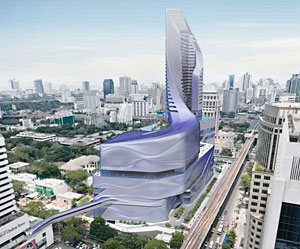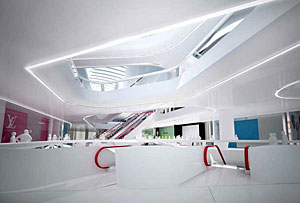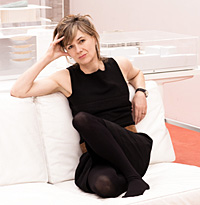|
Correction appended March 31, 2009
Amanda Levete, the former wife and business partner of the late Czech architect Jan Kaplicky, has announced the formation of a new firm that will carry on the exploratory spirit of their celebrated Future Systems office. Kaplicky, 71, died of a heart attack on January 14.
Amanda Levete Architects, based in London, has 35 employees, nearly all from Future Systems, and commissions ranging from a bridge in Dublin to the new London headquarters for Rupert Murdoch’s media empire and a mammoth luxury hotel and shopping mall in Bangkok, Thailand.
The March 12 announcement wasn’t a complete surprise. Levete and Kaplicky had been negotiating the split months before his death, with him focusing on a handful of projects in his native Czech Republic, including a new national library in Prague and a concert hall in Ceske Budejovice, and her concentrating on large commercial and institutional work, much of which she has secured through design competitions.
“We had been operating as two offices for a while and this agreement merely formalized that,” says Levete, who joined Future Systems in 1987. She and Kaplicky married in 1991 and divorced in 2006. “Jan and I had plenty of disagreements but never about whose work was whose.”


Rights to the Future Systems name were retained by Kaplicky’s widow, Eliska. The firm had no active projects at the time of Kaplicky’s death, according to a spokesman for Amanda Levete, and its future is unknown.
Future Systems, founded in a London warehouse in 1979, was a research driven office known for pushing forms, materials, and ideas to their limits. Levete says that her firm will continue that legacy, though with a less otherworldly, more culturally specific emphasis. The 1.5-million-square-foot hotel and shopping mall in Bangkok, for example, will be clad in 400,000 hand-made ceramic tiles based on traditional Thai crafts.
“We spent a huge amount of time studying Thai ceramics,” says Levete, “because we wanted a building that couldn’t be built in the same way in Europe or America. We even wrote a software program based on our research.”
Future Systems was more famous for projects that weren’t built than for those that were: solar powered cars, furniture for the international space station, a 200-story pink glass skyscraper—the range was extraordinary. And the projects that were realized, most notably the media center at Lord’s Cricket Ground in London and a free-form Selfridges department store in Birmingham, had a lyrical sensuality that few architects could match.
“Jan was a monumental part of my life,” says Levete. “We worked alongside one another for 20 years, so Future Systems is my story too. He will continue to inspire me in death as he did in life.”
Correction: At the time of Jan Kaplicky’s birth, the country now known as the Czech Republic was part of Czechoslovakia; however, in the sentence that refers to Kaplicky focusing on projects in his native country, we should have used Czech Republic, not Czechoslovakia.



Post a comment to this article
Report Abusive Comment